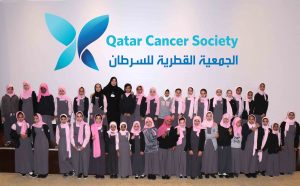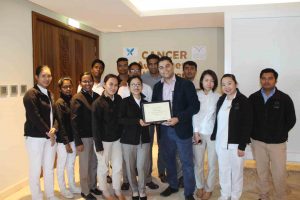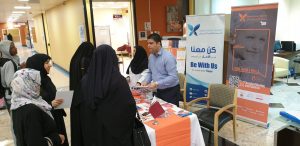World Cancer Day an Opportunity to Promote Early Detection
Qatar Cancer Society (QCS) marks World Cancer Day, which aims to raise awareness of cancer and to encourage its prevention, detection and treatment. Spearheaded by the Union for International Cancer Control (UICC), which QCS is one of its members, the day aims to save millions of preventable deaths each year by raising awareness and improving education about the disease alongside calling on governments and individuals across the world to take action. World Cancer Day is an international day marked on February 4 annually.
2019 will be the first year of the new three-year campaign, ‘I Am and I Will’. The new theme is an empowering call for personal commitment and represents the power of our actions taken now to reduce the growing impact of cancer

School Cancer Awareness
His excellency Sheikh. Dr Khalid Bin Jabor Al Thani, chairman of QCS stressed the importance of continuing efforts to raise awareness about cancer and ways to prevent it and to promote early detection as it is the cornerstone of prevention and treatment.
His excellency noted that QCS will mark World Cancer Day with a special event under the theme ‘I Am and I Will’, which targets all segments of the society and educate them about cancer and ways to prevent it in a simplified recreational way, In addition to emphasizing the importance of early detection of the disease.

Cancer Awareness – Banana Island Doha
According to the most recent reports published by Qatar National Cancer Registry (QNCR, 2015), breast, colorectal, and prostate cancers lie on top of the most common newly diagnosed cancers in Qatar. In terms of the most common newly diagnosed cancers among men in Qatar, QNCR (2015) has reported that prostate cancer, colorectal cancer, and leukemia are the top three cancers. On the other hand, the most common newly diagnosed cancers among women in Qatar includes breast, thyroid, and colorectal cancers. In 2018, more than 18 million new cases of cancer worldwide of which nearly 5 million cases of breast, cervical, colorectal, and oral cancers could have been detected sooner and treated more effectively, improving patient survival rates and quality of life.
The Union for International Cancer Control (UICC), in line with guidelines set out by the World Health Organization, recommends that all governments implement measures to reduce stigma and improve public awareness of the signs and symptoms of cancer, establish cost-effective population-based screenings and early detection programmes, strengthen national health systems’ referral mechanisms for suspected cancers to facilities providing diagnostic and treatment services, and increase investment in diagnostic capacities.

Cancer Awareness in NCCCR

